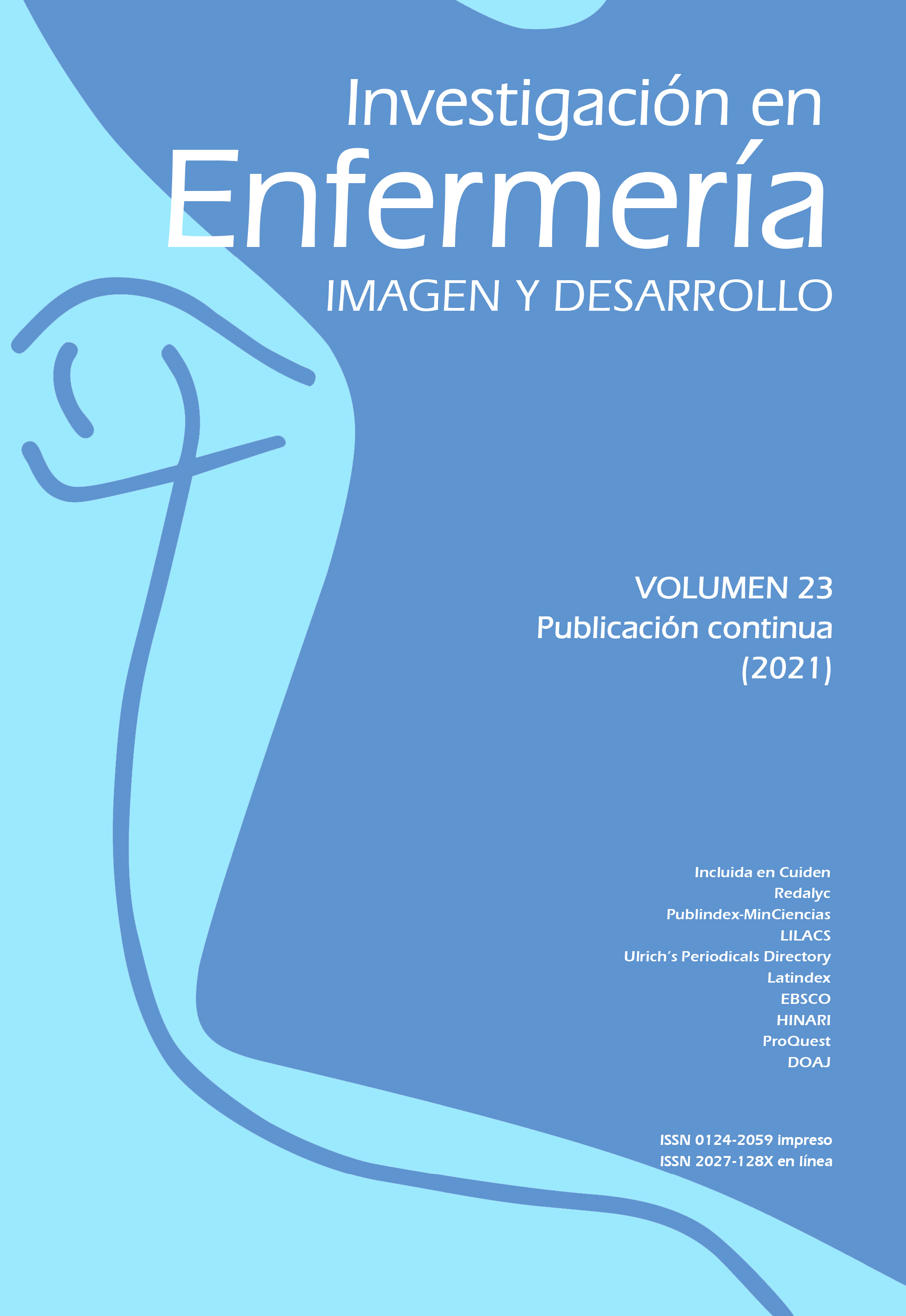Resumen
Introducción: los profesionales de enfermería son los cuidadores que prestan la mayor parte de la atención directa que reciben los pacientes. Comprender lo que los pacientes perciben como comportamientos de cuidado es esencial para adaptar las intervenciones de enfermería de tal manera que se llegue a satisfacer las necesidades del paciente. Objetivo: describir la percepción de los comportamientos de cuidado otorgados por enfermería que tienen los profesionales del área en una clínica de alta complejidad de la ciudad de Medellín (Colombia). Método: estudio descriptivo, transversal. Se incluyeron 81 profesionales de enfermería que laboraban en la institución para el 2018. Se utilizó un instrumento que mide la percepción del cuidado otorgado por el profesional, el cual se denomina: evaluación de los comportamientos de cuidado otorgado por enfermería (ECCOE). Resultados: de los 81 profesionales de enfermería que participaron en el estudio, la percepción de cuidado otorgado por enfermería tuvo una valoración global de 89,4%. En la relación de las puntuaciones promedio obtenidas en cada subescala, se observó mayores promedios para el soporte/protección/ambiente con 92,3%, asistencia en las necesidades humanas con 92,0%, humanismo/fe-esperanza/sensibilidad con 91,8%, y promedios menores en fuerzas existenciales/fenomenológica/espiritual con 88,6% ayuda/conanza con 86,5%, expresión de sentimientos positivos/negativos con 85,5% y enseñanza/aprendizaje con 84,7%. Conclusión: los profesionales perciben los comportamientos de cuidado de manera positiva. Fue posible establecer aspectos como ayudar al paciente a jarse metas para su salud, planicar cómo lograrlas y no abandonarlo ni alejarse cuando esté triste. Los hallazgos permiten orientar los comportamientos de cuidado para adaptar las intervenciones de enfermería y satisfacer las necesidades del paciente.
Guerrero Ramírez R, Meneses La Riva ME, De la Cruz Ruiz M. Cuidado humanizado de enfermería según la teoría de Jean Watson, servicio de medicina del Hospital Daniel Alcides Carrión. Lima-Callao, 2015. RENH. 2016;9(2):133-42. https://doi.org/10.20453/renh.v9i2.3017
Beltrán Salazar OA. The meaning of humanized nursing care for those participating in it: Importance of efforts of nurses and healthcare institutions. Invest. educ. enferm. 2016;34(1):18-28. https://dx.doi.org/10.17533/udea.iee.v34n1a03
Arredondo-González CP, Siles-González J. Tecnología y humanización de los cuidados. Una mirada desde la teoría de las relaciones interpersonales. Index Enferm. 2009;18(1):32-36.
Amezcua Martínez M. La humanización del cuidado y la atención personalizada en enfermería. En: Sacristán del Castillo JA, Núñez Cortés JM, Gutiérrez Fuentes JA, coordinadores. Medicina centrada en el paciente: reflexiones a la carta. Madrid: Fundación Lilly; 2018. p. 63-69.
Escobar Castellanos B, Cid Henriquez P. El cuidado de enfermería y la ética derivados del avance tecnológico en salud. Acta bioeth. 2018;24(1).
Rodríguez Á. Hacia la humanización en salud. ARS med. 2016;34(1):130-4. https://doi.org/10.11565/arsmed.v34i1.233
Turkel MC, Watson J, Giovannoni J. Caring science or science of caring. Nurs Sci Q. 2018;31(1):66-71. https://doi.org/10.1177/0894318417741116
Watson J. Assessing and measuring caring in nursing and health science. 2ª ed. Nueva York: Springer Publishing; 2009.
Brown C, Holcomb L, Maloney J, Naranjo J, Russell P. Caring in action: the patient care facilitator role. Int J Hum Caring. 2005;9:1-13.
Sierra Herrera MT, Cardona Cardona LP, Bernal Segura MF, Rozo AE. Percepción del cuidado de enfermería en diferentes instituciones hospitalarias de la ciudad de Bogotá. Av. enferm. 2006;24(1):68-72.
Poblete Troncoso M, Valenzuela Suazo S. Cuidado humanizado: un desafío para las enfermeras en los servicios hospitalarios. Acta Paul Enferm. 2007;20(4):499-503.
González-Ortega Y. Instrumento cuidado de comportamiento profesional: validez y confiabilidad. Aquichan. 2008;8(2):170-182.
Ayala-Valenzuela R, Calvo-Gil MJ, Torres-Andrade MC, Koch-Ewertz T. Evidencias para la filosofía de Watson: versión preliminar del caring behaviors assessment en Chile*. Rev Cubana Enfermer. 2010;26(1):42-51.
Morales-Castillo FA, Hernández-Cruz MC, Morales Rodríguez MC, Landeros Olvera EA. Validación y estandarización del instrumento: evaluación de los comportamientos de cuidado otorgado en enfermeras mexicanas. Enfermería Universitaria. 2016;13(1):3-11. http://dx.doi.org/10.1016/j.reu.2015.11.005
Heydari N, Torkaman M, Torabizadeh C. The relationship between nurses’ perceptions of caring behaviors based on Watson’s theory and of professional ethics: a cross-sectional study. Research Square. 2020; https://doi.org/10.21203/rs.3.rs-31487/v1
Morales Castillejos L, Gracia Verónica Y, Landeros Olvera E. Relación de la inteligencia emocional con el cuidado otorgado por enfermeras/os. Rev Cuid. 2020;11(3). https://doi.org/10.15649/cuidarte.989
Cifuentes JE, Manrique Abril FG. Satisfacción laboral en enfermería en una institución de salud de cuarto nivel de atención, Bogotá, Colombia. av.enferm. 2014;32(2):217-27.
Vujanić J, Prlić N, Lovrić R. Nurses’ self-assessment of caring behaviors in nurse-patient interactions: a cross-sectional study. Int J Environ Res Public Health. 2020 Jul 21;17(14):5255. doi: 10.3390/ijerph17145255. PMID: 32708178; PMCID: PMC7400290.
Alligood MR. Nursing theorists and their work. 9ª ed. Maryland Heights, MO: Mosby Elsevier; 2017.
Rocha Rodrigues MG, Séchaud L. Caring models in geriatric rehabilitation: an integrative review. Holist Nurs Pract. 2019 Jul/Aug;33(4):237-53. https://doi.org/10.1097/HNP.0000000000000336. PMID: 31192836.
Delmas P, Antonini M, Berthoud L, O’Reilly L, Cara C, Brousseau S, Bellier-Teichmann T, Weidmann J, Roulet-Schwab D, Ledoux I, Pasquier J, Boillat E, Brandalesi V, Konishi M. A comparative descriptive analysis of perceived quality of caring attitudes and behaviours between haemodialysis patients and their nurses. Nurs Open. 2019 Nov 26;7(2):563-70. https://doi.org/10.1002/nop2.421. PMID: 32089853; PMCID: PMC7024631.
Monje-V P, Miranda-C P, Oyarzün-G J, Seguel-P F, Flores-G E. Percepción de cuidado humanizado de enfermería desde la perspectiva de usuarios hospitalizados. Cienc. enferm. 2018;24:5. http://dx.doi.org/10.4067/s0717-95532018000100205
Landman Navarro C, Cruz Osorio M, García García E, Pérez Meza P, Sandoval Barrera P, Serey Burgos K, et al. Satisfacción usuaria respecto a competencia de comunicación del profesional de enfermería. Cienc. enferm. 2015;21(1):91-102.
Góes MGO, Crossetti MGO. Developing a spiritual care model for patients and their relatives in illness. Rev Gaúcha Enferm. 2020;41(esp):e20190150. https://doi.org/10.1590/1983-1447.2020.20190150

Esta obra está bajo una licencia internacional Creative Commons Atribución 4.0.
Derechos de autor 2021 Investigación en Enfermería: Imagen y Desarrollo


